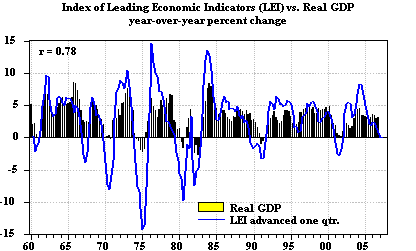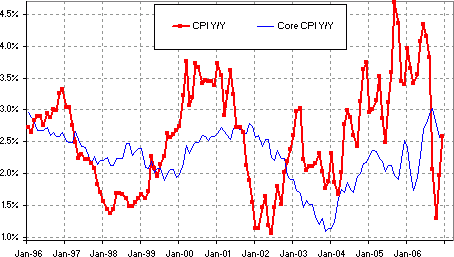
Analysis Topic: Economic Trends Analysis
The analysis published under this topic are as follows.Thursday, March 29, 2007
How Blind can they be? Poor state of the US Economy and Housing Slump being ignored / Economics / Credit Crunch
By: Peter_Schiff
As our phony economy begins to unravel before our eyes, it is amazing how few people can actually see it. The collective wisdom of stock market pundits, economists, and Federal Reserve officials gives the impression that everything is just fine.
Although some acknowledge that housing is slowing down a bit, that there are isolated problems with subprime mortgages, and that inflation is not moderating as quickly as they hoped it would (let's ignore surging oil prices), few can see any grave threats to continued economic expansion, or the bull market in stocks, bonds or real estate.
Read full article... Read full article...
Thursday, March 29, 2007
Asset Deflation : The Death of Real Estate / Economics / Deflation
By: Steve_Moyer
"I had a stick of CareFree gum, but it didn't work. I felt pretty good while I was blowing that bubble, but as soon as the gum lost its flavor, I was back to pondering my mortality." ~ Mitch Hedberg
I sell investment real estate in the San Francisco Bay Area. Have been for 25 years. It's a nice business. I've enjoyed it, and I value my clients.
My pappy's a realtor. My grandpappy was a realtor. My uncle's a realtor; so is my brother. Heck, some of my best friends are realtors (and it takes a big man to admit that).
Read full article... Read full article...
Thursday, March 29, 2007
Fed Jeopardizes US Dollar as it Neglects its Mandate / Economics / US Dollar
By: Axel_Merk
The U.S. dollar collapsed to two-year lows against the euro as the Federal Reserve (Fed) takes its focus away from fighting inflation. The Fed has a dual mandate: price stability as well as full employment. With unemployment hovering near historic lows, why does the Fed neglect its mandate to fight inflation, thereby jeopardizing the dollar?
Inflation has been creeping up throughout the economy, now showing up even in the "core inflation" statistics the Fed pays particular attention to. At the same time, the signs of an economic slowdown become ever more apparent. Fighting a slowing economy versus fighting rising inflation require diametrically opposed monetary policies. Given the low unemployment rate, rather serious reasons must exist for the Fed to deviate from its mandate to fight inflation. It is the Fed's role to take away the punchbowl when excesses are created in the economy. Over the past decade, the Fed has lost focus of its mission, blinded by misunderstood dynamics introduced by the internet and globalization. Let us examine why the Fed is shifting its focus to growth.
Read full article... Read full article...
Wednesday, March 28, 2007
Bernanke's JEC Testimony - Fed Still Worried Most About Inflation, However ... / Economics / US Economy
By: Paul_L_Kasriel
Am I missing something? Has not the FOMC marginally moved toward - not all the way to - an agnostic position with regard to its next likely directional change in the federal funds rate? That's what I took away from Fed Chairman Bernanke's JEC testimony and Q & A today. Yes, the FOMC still sees higher inflation as the "predominant policy concern ...[h]owever, the uncertainties around the outlook have increased somewhat in recent weeks."
One of those uncertainties has to do with business capital spending. To wit, "the magnitude of the slowdown [in business equipment and software expenditures] has been somewhat greater than would be expected given the normal evolution of the business cycle."
Read full article... Read full article...
Wednesday, March 28, 2007
Learning Curves - Yield Curve turns Positive, Recession ? / Economics / US Economy
By: Brady_Willett
Yesterday CBS's Mark Hulbert attacked bearish 'advisors' that neglected to announce that the U.S. yield curve was no longer inverted. Apparently Mr. Hulbert believes that those who pointed out that recession usually follows a curve inversion should have immediately ratcheted down their recession odds because the curve told them to do so.
"I'd be a very poor man if my wealth were dependent on getting a dollar for every one of those advisers who, since late last week, has even acknowledged that the yield curve has become positive again - much less conceded that, by the logic of their previous argument, a recession has become less likely.
It just goes to show how difficult it is to be truly objective in this business."
Read full article... Read full article...
Thursday, March 22, 2007
US Recession Imminent? Both the Leading Economic Indicators and the KRWI are Flashing Warning Signs / Economics / US Economy
By: Paul_L_Kasriel
Today the Conference Board reported that its index of Leading Economic Indicators (LEI) for February declined by 0.5% on the heel's of January's downwardly revised 0.3% drop. The January-February LEI average is down 0.49% from its Q1:2006 average. If the January and February levels of the LEI are not changed after revisions, then in order for the first quarter's LEI average to equal that of Q1:2006, the March LEI would have to increase 1.7%.
The last time the month-to-month increase in the LEI even approached this magnitude was back in March 2004, when it increased 1.4%. So, as of right now, the odds favor the first quarterly average year-over-year contraction in the LEI of this current economic expansion.
Read full article... Read full article...
Thursday, March 22, 2007
UK: Interest Rate Hike Expectations Ease But Don't Rule Out Further Tightening / Economics / UK Interest Rates
By: Victoria_Marklew
The minutes of the March 8 meeting of the Bank of England's (BoE) Monetary Policy Committee (MPC) have caught the markets by surprise, with an unexpectedly-dovish 8-1 vote to leave rates on hold, and the one dissenter a vote for a rate cut. The members noted that "the upside risk to inflation from wage growth might have started to diminish," and "financial market volatility added to the case for holding rates." So, can we assume that the current 5.25% repo rate is the peak? Not yet.
Yesterday came the news that the EU-harmonized rate of inflation , HICP, hit 2.8% in February, up from 2.7% in January - still far above the BoE's 2.0% medium-term target. The Retail Prices Index (RPI), the basis for most wage negotiations, climbed to a 16-year high of 4.6%.
Read full article... Read full article...
Tuesday, March 20, 2007
Gordon Brown's Budget 2007 - Likely to be his Last and Green / Economics / UK Tax & Budget
By: Shahla_Walayat
 Gordon Brown will later today deliver his 11th and last budget, given that Tony Blair is expected to make way for Gordon Browns premiership within the next 3 months.
Gordon Brown will later today deliver his 11th and last budget, given that Tony Blair is expected to make way for Gordon Browns premiership within the next 3 months.
The budget is likely to adopt many green initiatives following the conversion of the conservative party from blue torch to green tree. The chancellor is expected to appeal to home owners by giving incentives to install energy efficient products and possibly even home power generators such as solar panels and wind generators. The chancellor is expected to hit gas guzzling vehicles by raising the annual duty on 4X4's to as high as £400.
Read full article... Read full article...
Tuesday, March 20, 2007
The Root Cause Of Unemployment - Part 1: Destroying the Wage Fund / Economics / Money Making
By: Professor_Emeritus
A REVISIONIST THEORY AND HISTORY OF MONEY
Introduction
Economists have failed to find the root cause of unemployment. Keynesians have looked for it in the paucity of government debt. Friedmanites have tried to blame it on the inadequacy of central bank credit. Both orthodoxies were promoted, one after another, as state religion in the United States, with appalling results: destabilizing foreign exchanges, interest rates, prices; wiping out nine-tenth of the purchasing power of the dollar; even more of the value of bonds; not to mention the triggering of an avalanche of debt.
The Austrian school maintains that unemployment is the result of the high-wage policies of governments such as minimum-wage legislation and granting monopoly power to trade unions. However, this policy is more the effect than the cause. It prices less productive labor out of the market. We are looking for causes that hits the high-productivity end of the spectrum as well.
Read full article... Read full article...
Tuesday, March 20, 2007
US Recession Watch Perhaps, But Not Yet Warning / Economics / US Economy
By: Paul_L_Kasriel
Every recession commencing with the one in 1970 has been preceded by the combination of a negative spread between the Treasury 10-year yield and the federal funds rate and a year-over-year contraction in the CPI-adjusted monetary base (bank reserves plus currency). When both of these variables are calculated on a quarterly average basis, there have been no false recession alarms. To date, every recession has been preceded by at least two quarters of this combination. This is shown in Chart 1 in which the vertically-shaded areas represent recessionary periods.Read full article... Read full article...
Monday, March 19, 2007
Forbidden Research - Re-emergence of the Gold Standard / Economics / Money Supply
By: Professor_Emeritus
In order to soften the coming blow of a credit collapse, a group of concerned citizens has decided to establish, in the year 2007, the Gold Standard University Live, home for the study of monetary issues placed under taboo by other institutions of higher learning. Here is a partial list of forbidden research topics.
1. What is a gold standard?
A gold standard is a mechanism whereby people exercise their God-given right to create or extinguish money, while denying monopoly power of money-creation to would-be crooks. The individual, if he thinks that money is scarce, or the rate of interest is too high, can do something about it.
Wednesday, March 14, 2007
Mortgage Foreclosures and Housing Bust to result in US Interest Rate Cuts / Economics / Financial Markets
By: Jim_Willie_CB
A preface is in order, to honor Sir Alan Greenspan. The housing bust and the mortgage finance debacle have his signature on them. So far he is still revered, for some odd reason, probably basic ignorance. Some called Clinton the “Teflon Man” which more deservedly belongs to Greenspan. Heck, they both earned the title; they can wear it with the ignominy it so justly is associated with.
GREENSPAN SIGNATURE - The current mess of mortgage defaults and foreclosures testifies to the venerable and highly acclaimed serial bubble inflation engineer Greenspan's leadership and counsel as destructive in high order. Alan must be shuddering and cringing at the extreme damage to banking balance sheets, the spate of lending institution collapses, and the contagion within banks. He urged millions of US homeowners to rush into adjustable rate mortgages, so as to reduce their monthly costs. Here is an actual quote from Greenspan, extolling the virtues (vultures) of innovative mortgages.
Read full article... Read full article...
Wednesday, March 14, 2007
What's Down With Nominal US Retail Sales Growth? / Economics / US Economy
By: Paul_L_Kasriel
Asha will do her usual excellent job of synthesizing the February retail sales report and highlighting the important implications of it. But I wanted to call your attention to an interesting trend change in retail sales.Read full article... Read full article...
Wednesday, March 14, 2007
World Liquidity Crisis Emerging as the Yen Carry Trade Unravels / Economics / Yen Carry Trade
By: Christopher_Laird
With the unraveling of the Yen carry trade, a sequence of events has been set in motion for a world liquidity crisis. Combining this with ongoing pressure from US sub prime deterioration will further harm confidence in US and consequently Asian stock markets.
As of this writing, Asian markets are again down 2 to 3%. I had written last week that confidence in financial markets were dealt a major blow in the first wave of Yen Carry unwinding a week or so ago in the article titled Damage Has Been Done.
This week, we are seeing the second phase of market declines, the US Dow down 230, and as I said Asian markets down 2 to 3% again. To say the least, market sentiment is getting crushed globally.
Read full article... Read full article...
Wednesday, March 14, 2007
US Housing recession increasing risks of US Economic recession as growth continues to slow / Economics / US Economy
By: Paul_L_Kasriel
Three quarters of below potential growth and counting.
As everyone knows, the housing recession is the biggest drag on the pace of economic activity right now. But is the housing recession at its bottom? And more importantly, are there negative multiplier effects emanating from the housing recession? With regard to whether the housing recession has hit bottom; it is doubtful. In an average housing downturn, real residential investment expenditures decline by about 25% peak to trough.
Chart 1

Wednesday, March 07, 2007
US and Global Economy Strong and inflation under control - Henry Paulson / Economics / Strategic News
By: Sarah_Jones
U.S. Treasury Secretary Henry Paulson expressed confidence in the global economy - "We have a very strong global economy," Paulson said after a meeting with South Korean Finance Minister Kwon O-kyu. "We have a global economy with low inflation, high levels of liquidity and I feel very comfortable with the global economy."

Friday, March 02, 2007
Crash Proof: How to Profit from the Coming Economic Collapse / Economics / Investing
By: Peter_Schiff
With the recent sharp decline in the stock market, the timing of the official release of my new book "Crash Proof" this Monday could not have been better. Ironically the media and Wall Street are assuring investors that the fundamentals have not change and that all is well. Of course what these market cheerleaders do not understand is that the fundamentals are just as lousy now as they have always been. In fact, they are about to get a whole lot worse!
Despite the upbeat tone coming out of Washington and Wall Street, the U.S. economy is only a shadow of its former self. The country has gone from being the world's largest creditor to its greatest debtor; the value of the dollar is sinking; domestic manufacturing is winding down -- and none of these trends seem to be slowing down.
Read full article... Read full article...
Friday, March 02, 2007
Yield Curve Inversion and Inflation - Consumer Price Index (CPI) / Economics / Analysis & Strategy
By: Adam_Oliensis
While many argue that the Consumer Price Index is a flawed indicator (some claim it understates inflation and others claim it overstates inflation), it does generate heated debate and can act as a catalyst for stock-market activity. In the context of Fed Chairman Bernanke's relatively dovish comments before both houses of Congress last week, a surprise on the CPI data could easily spur market volatility this coming week.
Currently the consensus estimate is for a +0.1% M/M on the CPI, which is below trend, and would be bullish for stocks. The most recent Y/Y reading stands at +2.61%...

Thursday, March 01, 2007
Stock Market Shocks, Money Supply Liquidity and the US Dollar / Economics / Analysis & Strategy
By: Jim_Willie_CB
Events in the last week have certainly caused a stir. Just what precipitated the broad global selloff. Was it the unwind of the Yen Carry Trade, a week delayed? Was it only attributable to the Chinese and their more stern stance against adolescent credit abuses in the Middle Kingdom?
Was it Al Greenspan's comments on an economic recession looming near on the horizon? Was it caution on risk pricing in view of the insane Iran vs USA posturing in the Persian Gulf? Was it Goldman Sachs orchestration with collusion from Beijing, after massive short positions were put in place? Were the GSax powers motivated by the alarms going off in the gold and silver markets, as gold neared $700 and silver passed $14? Methinks all the above, never just one factor in an increasingly complex financial world. The global markets have become a tangled web.
Read full article... Read full article...
Thursday, March 01, 2007
First Inflation then Deflation? - Financial Markets Crash / Economics / Analysis & Strategy
By: Christopher_Laird
With gold up at $680, it looks like $700 is around the corner. So then, if a big gold surge is around the corner, one may ask, what is a longer term prognosis for not only gold but financial markets? Answer: first inflation and then deflation.
Right now, the world is inflating like mad. Money growth in most of the major world economies is near or exceeding 10% a year, and China is the biggie at 18% plus. That, combined with historically low interest rates is causing huge finance and asset bubbles. Central banks are way behind the inflation/interest rate curve right now, and are basically stuck in that rut because if any of them combat inflation by raising interest rates, they find their currencies strengthen, and lose market share.
Read full article... Read full article...

